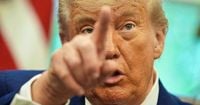When U.S. President Donald Trump signed an executive order on August 21, 2025, establishing the National Design Studio, it marked the beginning of a bold new effort to overhaul the government’s digital presence. At the helm of this initiative is Joe Gebbia, the 44-year-old co-founder of Airbnb and a current Tesla board member, whose mission is to make American government websites as sleek, intuitive, and enjoyable to use as the Apple App Store. It’s a tall order, but Gebbia’s track record in the tech world has many watching closely—and some skeptically—as he takes on this high-profile role.
The National Design Studio, as described in the executive order, will advise federal agencies on usability, aesthetics, and standardized design, all while aiming to cut duplication costs. Scheduled to operate for just three years before closing its doors, the agency is being touted as a stripped-down successor to the Department of Government Efficiency (DOGE), a controversial body formerly led by Elon Musk. According to Keystone-SDA, Musk departed from DOGE in late May 2025 after a heated dispute with President Trump over a tax and budget bill, leaving a vacuum that Gebbia is now tasked to fill.
Gebbia wasted no time after his appointment, taking to X (formerly Twitter) to lay out his vision and rally support. "My directive is to update today’s government services to be as satisfying to use as the Apple Store: beautifully designed, great user experience, run on modern software. An experience that projects a level of excellence for our nation, and makes life less complicated for everyday..." he wrote, echoing a sentiment that has resonated with many Americans frustrated by clunky, outdated government websites. He added that he would "do his best to make the US the most beautiful, and usable, country in the digital world."
But what exactly is the National Design Studio? The agency’s remit is clear: help federal agencies modernize their digital services, making them more accessible and user-friendly while reducing waste. The idea, according to the executive order, is to bring the kind of design discipline seen in top tech companies to the public sector. Gebbia has even compared the vision to the Apple App Store, promising services that are simple, reliable, and satisfying to citizens—no small feat given the notorious complexity of government bureaucracy.
Gebbia’s path to this point is a quintessential Silicon Valley story. In 2007, facing a sudden 20% rent hike in San Francisco, he and his former Rhode Island School of Design classmate Brian Chesky came up with a creative solution: rent out airbeds in their apartment during a major design conference, when hotels were fully booked. Their website, "AirBed & Breakfast," drew three bookings and helped them cover the rent. The following year, Nathan Blecharczyk, a Harvard graduate who had also faced a steep rent increase, joined as the third co-founder. The rest, as they say, is history. By 2024, Airbnb had hosted more than 1.5 billion guest arrivals, operated in over 220 countries and regions, and boasted a market value in the tens of billions of dollars after its 2020 IPO on Nasdaq.
Gebbia’s influence in the tech world extends beyond Airbnb. He’s a board member at Tesla and was previously tapped by Elon Musk to join DOGE, a Trump-era initiative aimed at identifying and eliminating unnecessary federal spending. According to BBC, Gebbia was also tasked with digitizing the U.S. federal retirement system and became part of a "small council of advisers" overseeing DOGE after Musk’s departure. His experience in both the private and public sectors gives him a unique vantage point as he undertakes the daunting task of redesigning government digital services.
Yet, Gebbia’s appointment is notable for more than just his professional background. Once a major donor to the Democratic Party, he made headlines in 2024 by shifting his political allegiance to Trump, citing disillusionment with his former party. This move raised eyebrows in both political and tech circles, with some seeing it as a pragmatic decision to align with the administration in power, and others viewing it as a genuine change of heart. Whatever the motivation, his new role places him at the intersection of technology, politics, and public service—a crossroads that has proven tricky for even the most seasoned operators.
One of Gebbia’s first moves as head of the National Design Studio was to invite collaborators. As reported by Keystone-SDA, he put out a call on X for anyone interested in joining the project to send him links to their previous work. It’s a Silicon Valley-style recruitment drive that signals his intention to build a team of top-tier designers and technologists, rather than relying solely on government insiders. Whether this approach will fly in the often slow-moving world of federal bureaucracy remains to be seen, but it’s certainly a departure from business as usual.
The backdrop to all this is the abrupt end of Elon Musk’s tenure at DOGE. Musk, the tech billionaire behind Tesla and X, led the cost-cutting committee for Trump until late May 2025, pushing for massive cuts and job reductions across federal agencies. According to Keystone-SDA, his departure followed a dispute with Trump over a tax and budget bill, highlighting the challenges of marrying Silicon Valley’s disruptive ethos with the realities of governance. Gebbia, who joined DOGE as Musk’s adviser and helped oversee the agency after Musk left, now faces the challenge of delivering results where others have stumbled.
For the next three years, all eyes will be on Gebbia and the National Design Studio. Can a tech entrepreneur known for revolutionizing travel do the same for government services? Will his vision of "beautifully designed, great user experience, modern software" become a reality for millions of Americans trying to navigate everything from Social Security to small business loans? Or will the weight of bureaucracy, politics, and legacy systems prove too much even for a Silicon Valley star?
As Gebbia himself put it, the goal is nothing less than making the United States "the most beautiful, and usable, country in the digital world." If he succeeds, it could set a new standard for how governments serve their citizens in the digital age. If not, it will serve as another reminder of just how difficult real change can be—even with the best intentions and the brightest minds.


